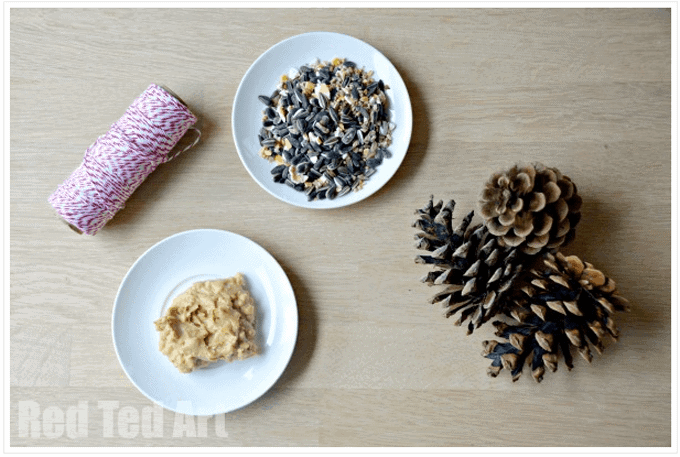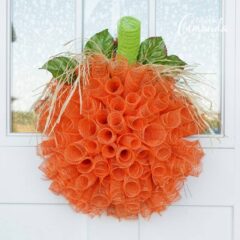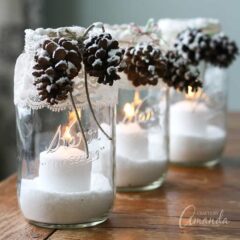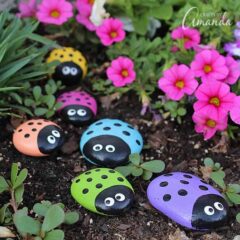More than ten years ago I wrote an article addressing the old wive’s tale of how you shouldn’t use peanut butter on those cute little pinecone bird feeders or bird seed ornaments because birds can choke and die. There’s simply no evidence to support that. I did some thorough research so that I would have solid answers for concerned readers. It was previously published on my old site, but I have decided to post it here as well.

This choking myth has made its rounds on the Internet quite a while ago but you still hear about it today. So I checked in with several bird experts to find out the real truth and debunk the myths once and for all.
Some of these myths include:
- birds choking on wads of peanut butter
- salt and sweeteners in peanut butter being harmful
- birds becoming dependent on home bird feeders as their food source
Peanut Butter, Salt & Sweeteners
Kim Calcagno, Refuge Manager of the Powder Mill Ledges Refuge and Fort Nature Refuge, Audubon Society of Rhode Island , says “These are warnings you hear a great deal, even from some naturalists like myself. There is however, no hard evidence to support either one. Peanut butter is high in protein and fat and in some ways mimics the nutrition that insect-eating birds (like woodpeckers or nuthatches) might seek. The seed eating birds like the fat and protein too, but aren’t perhaps as used to the sticky nature of the peanut butter as a bird who eats insects with their gooey guts. Birds’ tongues are small and are not muscular and articulate like a human’s is. Sticky foods are more of a chore for them, but there is no evidence of them choking on it. Years back when this was a real controversy, we would mix peanut butter with corn meal to make it more textured or corn starch to make it less sticky. In my opinion, it really wouldn’t matter if peanut butter is salted or sweetened.”
Kim also suggests that if you are concerned about peanut allergies in children, you can use vegetable shortening in its place as we have indicated in the above craft. Bill Thompson, III, editor of Bird Watcher’s Digest and valued part of the American Birding community adds “This topic is hotly debated, but there is no scientific evidence one way or the other. We humans sometimes have trouble digesting large mouthfuls of peanut butter, so is it logical that the same is true for birds? Not really. Birds’ bills do not have as much saliva as human mouths, so it is less likely that the peanut butter will get gooey and stuck to the roof. To be safe, it’s smart to mix chunky peanut butter with whole oats, raisins, cornmeal, and other ingredients to make it drier and more solid, and thus less sticky when it enters a bird’s bill.” Special thanks to Shelby Starkey of the Golden Gate Audubon Society for sharing this information.
Dependency on Feeders
We also asked if birds would fly to the point of exhaustion to get to your feeder, would they become dependent on them? Kim answers “Bird feeding is a human contrivance. Humans do it as a hobby, because we enjoy watching the birds, and while it is tempting to entertain the idea that the birds NEED us to feed them or become reliant on us, the fact is that they have been surviving winter weather for millions of years without our help. In nature you have to be able to adapt to sudden changes in food supply (e.g. a heavy storm, a flood etc). If you go away on vacation and don’t feed the birds for two weeks, they are not going to experience dire hardship. They will look elsewhere. The food they obtain from a bird feeder is only a percentage of what they are eating, anyway. They will seek berries, seed heads and pull insects out of their winter hiding places and will visit other people’s feeders too. They are adapted to seeking and finding food. There will always be a few winter casualties, but that is normal and part of the balance of nature. The only time when bird feeders may form the bulk of a bird’s diet is after severe ice storms when ice sheaths all branches and other surfaces. Birds may rely on feeders for a day or two, because it is ‘easy pickings’ (as opposed to pecking through ice to get to seeds and buds etc).
The other thing to consider is that if you put out a pine cone feeder and don’t otherwise feed the birds on a regular basis, that pine cone is really only a tiny source of food for a short period of time-like an hors d’oeuvre. Also, the only birds that will come to your feeders are ones that are living relatively close by. There should rarely, if ever, be an occasion of a bird having flown so far they are exhausted.” Kim also tells us that while providing a water source for your feathered friends is not necessary, it is helpful. “The one area that can benefit them greatly in the winter is providing an open water source for them in the form of a bird bath with a heating coil in it. This allows them to drink and bathe without having to travel too far to a stream or unfrozen pond edge.”
Shelby Starkey of Golden Gate Audubon Society also shares “They feed on quite a variety and many insects, grubs and worms, as a source of protein. Our feeding stations are a supplement in most instances. When and where weather is the harshest it may be prudent to maintain feeding though again there is much to be learned. We’re a part of a huge system and often not the source of all others sustenance and survival. The system functions with us as a part of the whole, as I’m certain you know. It is important when feeding to keep our station clean so as not to perpetuate diseases.” Georgann Schmalz, Ornithologist and Director of Communications for the Atlanta Audubon Society and editor of Birding Adventures adds “Most recent research has shown that birds do not rely upon one feeder but have quite a few staked out in an area. Sometimes that area is quite large so that any particular bird may not visit one feeder more than once a week. Therefore, letting your feeder become empty should not harm the birds that have been using it since they can visit the other feeders.
And in the more moderate climates of the SE US, birds do not depend upon feeders, but use the nuts and seeds of fields and forests. Feeders, for the most part in warmer climates, are only to attract birds close to us for our pleasure. However, if someone’s feeder is the only one in existence, and it is extremely cold (not about freezing even during the day) and the natural vegetation is deplete of fruits and nuts (like in late February), it is possible that a bird might become dependent upon that feeder. Then it would be important to keep it filled. But even then, I doubt that any bird flies to point of exhaustion to get to a feeder. After all, what did they do before that feeder was put out? I think the biggest issue of feeders is making them healthful for birds-keeping them clean, keeping the seed dry and keeping the seed off the ground where bacteria and fungi spoil them.”
So enjoy your feathered friends and help debunk myths on the internet by asking questions of experts. Make sure that you are asking an actual bird expert rather than just an enthusiast as they may have received erroneous information as well. It’s always important to do your research before sharing viable information with friends, family and associates. Special thanks to all those experts that contributed to this fact finding article.
Other excellent sources of information on topic include:
- Bird-feeding Myths (The Great Backyard Bird Count)
- Feeding Birds in Your Yard – The Basics (pdf file) (Wisconsin Society for Ornithology)
- Cold Weather Cookin’ for Birds(WildBirds.org)
- Frequently Asked Questions About Birds and Bird-feeding (Project Feeder Watch – Cornell University Lab of Ornithology)
- Bottle Cap Flower - April 2, 2024
- 7 Cool Ways to Decorate Easter Eggs - March 19, 2024
- Cardboard Tube Lambs - March 12, 2024








Eva says
Hi Amanda, I will be trying this on our two cockatiels! It will be a treat for them both especially if I add cheerios and oats to the seeds!
Thank you so much for the information above.
Eva
Liz Allsworth says
I am trying to encourage birds into my garden and this information is really helpfull ,thank you
Cindy W. says
That was a very informative post, Amanda. Thank you!